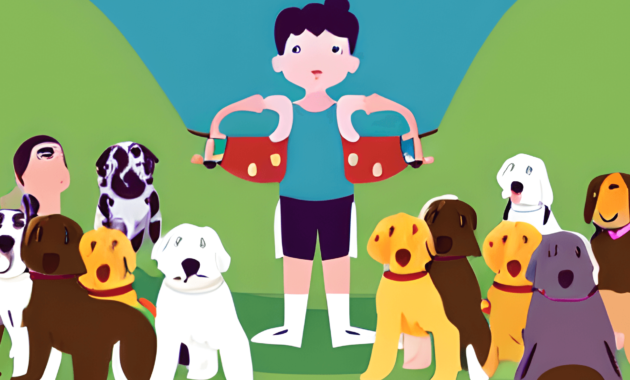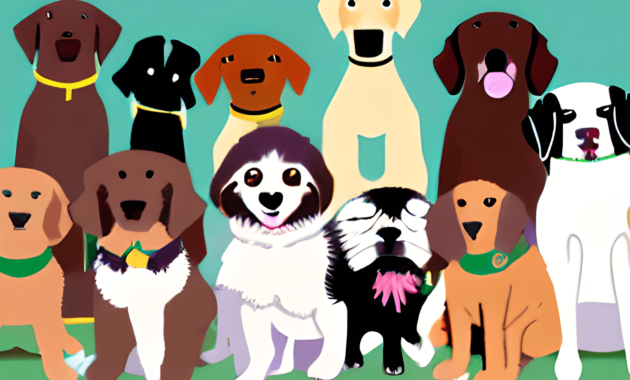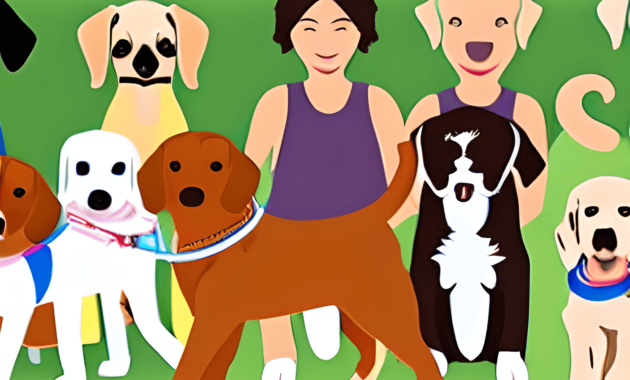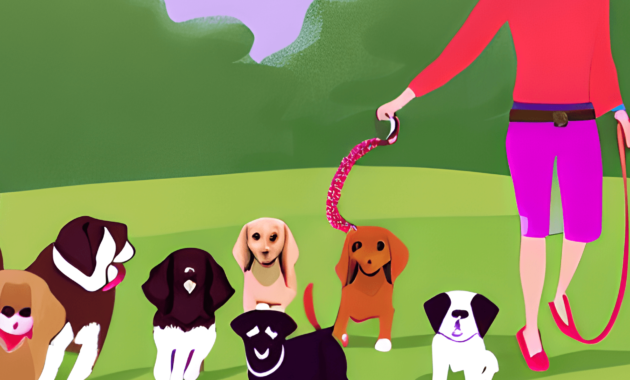
Are you considering owning a pup for the first time? There’s nothing quite like having a furry friend to come home to! Owning a dog is a big responsibility but can also be gratifying.
To ensure that your first experience with pet parenthood is successful, here are five tips for first-time dog owners. You’ll want to ensure you’re prepared for the changes and challenges of owning a pup. From choosing the right breed for your lifestyle and budget to getting all the necessary supplies and training, we’ve got you covered.
With our advice – explicitly tailored for new dog owners – you can give your four-legged friend the best care possible. So let’s get started!
Table of Contents
- Choosing The Right Breed
- Establishing A Budget
- Purchasing The Necessary Supplies
- Training Your Dog
- Creating A Healthy Routine
- Frequently Asked Questions
- Conclusion
Choosing The Right Breed

Picking the perfect puppy can be a reflective process, but with proper preparation and research, you’ll have your pup-pal in no time.
When selecting a breed, it’s essential to adopt rescues whenever possible. Returns often come with a unique personality and intriguing history, making for a special bond between you and your pet.
Before taking the plunge, take the time to research various breeds to find one that best fits your lifestyle. Big or small, active or laid-back – there is something for everyone! When exploring options, consider factors such as energy levels, exercise needs, adaptability to different environments, grooming requirements and dietary needs. This will help ensure that you both have a happy future together.
By doing your breed research and committing to adopting rescues whenever possible, you’ll be well on your way towards finding a furry friend who loves you unconditionally for many years to come. With the right breed in mind and an open heart, you can look forward to welcoming home your new companion!
Establishing A Budget

As a first-time dog owner, establishing a budget is essential to responsible pet care. Vet visits will be one of your most significant expenses, and it’s necessary to factor in the cost of routine checkups and any additional treatments that may arise. Research local vet offices to get an idea of the fees they charge, and look into different pet insurance plans that can help offset some of these costs.
Food costs are another expense you must consider when creating your budget. Many high-quality food options exist, but be sure to research which is best for your pup’s age and breed. You should also buy food in bulk, as this is usually more cost-effective.
Remember that healthy treats are just as important as nutritious meals – so don’t forget to include them in your budget too! It’s vital to plan when it comes to finances for your new furry friend – not only does this ensure you can provide them with the best care possible, but it also helps take away some of the stress associated with pet ownership. Allocating money for vet visits and food helps ensure you’re always prepared for whatever life throws at you and your pup!
Related Articles
Introducing Your Baby to Your Dog – What Things Should You Know?
Do You Want to Become A Foster Parent for Dogs? Here are Some Tips for You
Best Dog Foods – What Is The Healthiest Meat For Dogs
Short Dogs – Napoleon Complex In Dogs
Purchasing The Necessary Supplies
Once you’ve established a budget for your new pup, it’s time to start picking up the supplies necessary for a great life together. From finding the perfect vet to setting up a crate, there’s plenty of groundwork required before your pup comes home.
First, research veterinarians in your area and find one that fits your pup’s needs and your own. Ensure you know their services, such as preventive care or emergency treatment. Please have a few options ready if one isn’t available when needed.
Once you have a vet picked out, register with them so they can start building their records on your pup immediately.
Next, find an appropriate space for a crate or kennel, as this will become their safe space while transitioning into their new home. It should be big enough for them to stand up, turn around and lie down comfortably but small enough that they don’t feel overwhelmed by their surroundings.
When bringing the crate home, line it with blankets and toys to make it cozy and inviting. Remember that training the pup to enter the crate is essential, too – never force them inside! With plenty of positive reinforcement and treats, you’ll soon have them comfortable in their designated spot in no time.
Taking care of a furry friend can be overwhelming at first, but proper planning goes a long way in helping ensure everything goes smoothly for years to come. Follow these steps now, and you’ll be ready to welcome your new companion when the time comes!
Training Your Dog

Training your dog is an essential part of successful pet ownership. It can be challenging to figure out the best approach for teaching a pup – but it doesn’t have to be. With the proper methods, you can ensure that your puppy grows obedient and well-mannered.
The age-old debate about whether or not dogs should be trained with positive reinforcement or punishment is ongoing. However, research suggests that positive reinforcement yields better results in the long run. Positive reinforcement involves rewarding desirable behaviours while ignoring undesirable behaviours. This can include treats, verbal praise, and petting your pup when they do something right.
When socializing puppies, they must be exposed to different people, animals, environments and situations as early as possible. This helps them get used to various stimuli and behave correctly around other living beings.
Additionally, crate training is a great way to housebreak a puppy and teach them basic commands such as “sit” and “stay”. Start by placing their toys in the crate, then gradually increase their time spent inside until they are comfortable spending extended periods there.
By combining these two strategies – positive reinforcement and socializing puppies/crate training –, you can ensure that your pup will become an obedient and well-behaved member of your family in no time!
Creating A Healthy Routine
Creating a Healthy Routine for Your First-Time Dog Owner
Creating a routine for your pup can be daunting for a first-time dog owner. However, it is essential to help your pet adjust and thrive in their new home. Properly, you can create an environment filled with security and love that will allow you and your furry friend to form a strong bond.
| Steps | Benefits |
|---|---|
| Socializing Safely | Improves socialization skills |
| Regular Exercise | Keeps them healthy & fit |
| Training | Strengthens bond |
Below are some tips and tricks that will help you get started on the road to success:
- Socialize Safely – Dogs need regular interaction with other people and animals to develop their socialization skills properly. Take your pup to the park or on walks to meet people and other dogs, but always practice safe social distancing.
- Regular Exercise is essential for any dog’s overall health and wellness. Taking your pup on daily walks or playing catch in the backyard helps keep them physically active while providing mental stimulation.
- Training – Training strengthens the bond between you and your pet while teaching them essential commands like “sit” and “stay” that they can use throughout life. Look into local classes or online tutorials if you want an extra guidance boost!
With these tips in mind, creating a healthy routine for your pup should be more accessible than ever! So don’t be afraid to dive right in – before long, they’ll thank you with plenty of tail wags and sloppy kisses!
Frequently Asked Questions
What Is The Best Way To Introduce A New Dog To Other Pets In The Home?
Introducing a new pup to other pets in the home can be tricky. To ensure a smooth transition, experts recommend socialization strategies and puppy classes. This helps the dog learn how to interact with other animals positively.
It’s essential to take things slowly as you introduce them, allowing them to get used to each other’s scents before they meet face-to-face. Give your new pup plenty of treats during the introduction process and reward good behaviour.
With patience and careful supervision, your pets should soon be able to interact and become best friends safely!
How Do I Know If A Particular Breed Is Suitable For My Lifestyle?
Temperament assessment is critical when researching a particular breed to determine if it suits your lifestyle.
It’s essential to look into the breed’s history and characteristics to see how it will fit in with your everyday life. You’ll also want to consider their energy level, size, and grooming needs.
Additionally, you may want to consult an experienced pet care writer or veterinarian for advice. Ultimately, the decision is yours and should be made based on careful research and considering all factors.
What Vaccinations Does My Dog Need?
Vaccinations are essential to pet care and a must for any new pup.
All puppies need the core vaccines, which include rabies, distemper, parvovirus, and hepatitis.
Additionally, depending on where you live and your pup’s lifestyle, your vet may recommend additional vaccines like leptospirosis or Bordetella (kennel cough).
Socializing your pup with other dogs and people is also essential to help them become more confident and comfortable in new environments – this is vital for their development!
How Do I Deal With Separation Anxiety?
Dealing with separation anxiety in dogs can be tricky for first-time owners. Fortunately, there are some positive reinforcement and socialization strategies you can use to help your pup through this challenging time.
Start by providing plenty of verbal praise and treats when your dog is calm when you leave the house. You can also try gradually increasing your dog’s time alone, rewarding them for good behaviour each time you return.
Socializing with other canine friends will also help reduce their stress levels, so ensure your dog gets plenty of playtime with fellow pooches!
How Do I Potty Train My Dog?
Potty training your pup is an essential part of bonding and socializing them. Practical potty training requires consistency, patience, and a positive attitude.
Start by establishing a regular potty time routine. Take your pup out to the designated area at the same time each day and reward them with verbal praise or treats when they go in that spot.
Additionally, please keep track of their eating and drinking schedule; this will help you anticipate when it’s time for them to go outside. Bonding activities such as playing fetch or tug-of-war can reinforce the idea that going outside is fun and should be praised.
With some practice and patience, your pup will start to understand what you’re teaching them!
Conclusion
Being a first-time dog owner is a big commitment, but it can be an enriching experience with some research and preparation.
Understanding your new pet and its needs will help ensure you have a happy and healthy puppy for years.
It’s important to remember that every dog is different – what works for one pup may not work for another.
But with patience and dedication, you’ll soon reap the rewards of being a dog parent!
Plus, you’ll have a loyal companion by your side through thick and thin.
So don’t let the unknowns stop you; take the plunge today and enjoy all the memories that await you!




